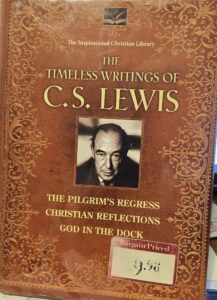
I continue to work my way through the writings of C.S. Lewis, hoping to get through them all in my lifetime. I got a late start on it, so am having to read them a little faster than I would like. Thus, I’m not sure I have the comprehension I want of his works.
The most recent book of his I completed was God In The Dock. This is a collection essays Lewis wrote over his lifetime, many of which were published in magazines, a few being pulled from things never published. The book itself was published posthumously by Lewis’s editor, Walter Hooper. The book is divided into four parts: theological essays; semi-theological essays; and essays on ethics rather than purely Christian. The fourth part to the book is excerpts from a number of letters that Hooper felt made a good addition to the book, consistent with the other subject matter.
I read this book in three different time spans, one each for parts 1 and 2 and a third for parts 3 and 4. I think this was a good way to do it. It kept me from becoming bogged down reading the same kind of things all over again. And the short nature of essays made it easier to concentrate on what Lewis was saying in them, as compared to his longer works that caused me to zone out.
One essay that particularly stood out to me was “The Humanitarian Theory of Punishment”. Lewis wrote it in 1949 when the U.K. was debating whether incarceration should be retributive or healing. Lewis makes a good case that maintaining a prisoner in jail until he is “healed” can be a form of tyranny. Never declare the patient healed and you can hold him forever. The article, which was published in an Australian magazine, prompted response letters and a rejoinder by Lewis. Oh, he did live to argue and debate! I intend to study this sequence of article and letters more to get a better handle on the subject. It’s always good when you can
I think Hooper did a very good job in putting this anthology together. But it does get a little confusing. The version I had was in an even larger anthology titled The Timeless Writings of C.S. Lewis. But God in the Dock was also published as a stand-alone book. But as I look at the contents, it seems that several essays varied depending on the edition of the book.
Also, Lewis had one specific essay titled, “God in the Dock”, from which the book title is derived. That creates some difficulty. When someone says, “Lewis said this in God in the Dock, are they referring to the essay or the anthology? And which essay within the anthology? It makes citing the work somewhat difficult.
I give the book 5-stars. Although some of the essays weren’t stellar, that will be true in any anthology. I’m keeping the volume in my growing C.S. Lewis collection. Most likely I’ll never read it again cover to cover, but I’ll re-read different essay in it and perhaps write my own in response.